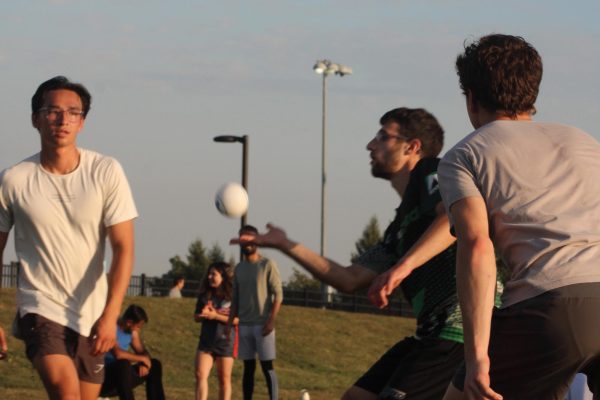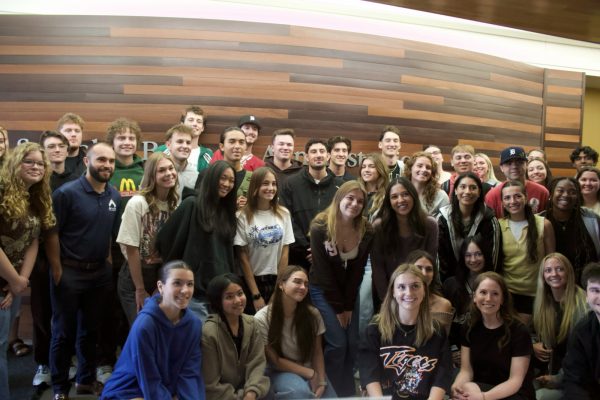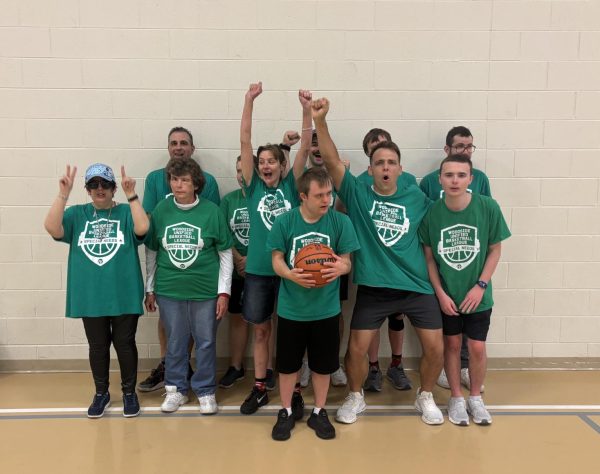Last Lecture Researcher and professor Barry Winkler looks back on his achievements
Working at the Eye Research Institute, researcher and science professor Barry Winkler has been working at Oakland University for over 40 years.
On March 19, Winkler, who is set to retire in August 2012, held a formal final lecture in the Gold Room of the Oakland Center.
Titled, “Form Growing Up in Brooklyn, to Maturing (Sort of) After 40.8 Years in the Eye Research Institute,” Winkler’s presentation was a humorous and reminiscent look back at his life’s achievements.
From meeting his wife as a teenager in New York, to making a family and discovering his love for biomedical research, Winkler spoke of every avenue of his life with a profound joy.
Professor and director of the ERI, Frank Giblin, introduced Winkler.
“(We commend Winkler) not only for his research, but for his very fine records of teaching and
serving,” Giblin said. “He is by far the leading expert in the world (of retinal research).”
New York to Michigan
Winkler chose to come to Oakland in part because of the level of freedom offered, he said.
Winkler interviewed with Dr. V. Everett Kinsey over lunch in the OU student cafeteria (located in the basement of the Oakland Center at the time), and was offered the job immediately after the unconventional meeting.
After starting work in 1971, Winkler soon began teaching as well.
Kinsey worried about the effect that the stresses of teaching would have on Winkler’s research, but he requested the expansion.
“I knew I needed more contact with students,” Winkler said.
Winkler has taught classes on neurobiology, as well as select classes in the Honors College.
Outside of the classroom, Winkler works specifically with undergraduate students. He has worked alongside over 50 students during his time here at OU, and still keeps in contact with many of them.
“I recently had a student come up to me, and say, ‘Dr. Winkler, thank you for not being boring,” he said.
‘Look for the odd finding’
Winkler credited the discovery of his passion and dedication for his work to his mentor, Werner K. Noell, a researcher and professor he met while studying at the University of Buffalo Medical School.
“(Werner) taught me how to find love in doing an experiment,” Winkler said.
Winkler highlighted his mentor’s wisdom in a paraphrasing of what he would say to motivate him.
“Always look for the oddity or the unusual in everything you read and in every experiment you do, because ultimately that will prove interesting and useful, even though you wont know it initially,” Winkler said in his presentation.
During his hour-long lecture, Winkler discussed the difficulties he faced in his line of work, and how he overcame them with this motto in mind.
Doing his retina research on small animals, Winkler discovered he had an allergic reaction to the animals. His doctor told him he could no longer do the work, but Winkler discovered a method for removing the retina and keeping this tissue alive; a method later termed “Winkling.”
Throughout the lecture, Winkler discussed his work with passion and pride.
The retina is an absolutely fascinating tissue, especially the rods and cones, which is the most unique of it all, he said.
After all of his hard work, first in New York, and then here in Michigan, Winkler is ready to retire.
“People always told me, ‘You’ll know when it’s time,'” Winkler said. “And it’s time for me to step aside.”
–Contact multimedia reporter Brian Figurski via email at [email protected] or follow him on Twitter @WhatDidBeefSay
–Contact Life Editor Clare La Torre via email at [email protected]





